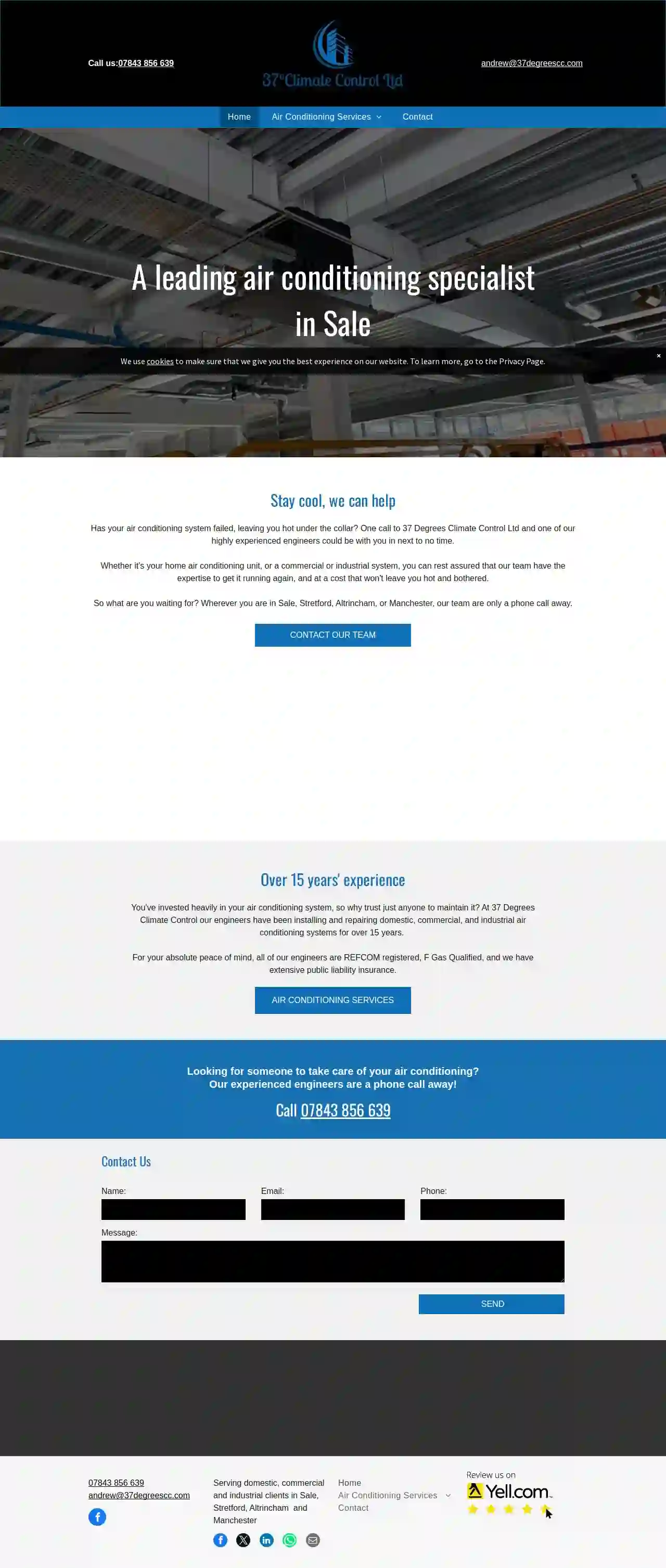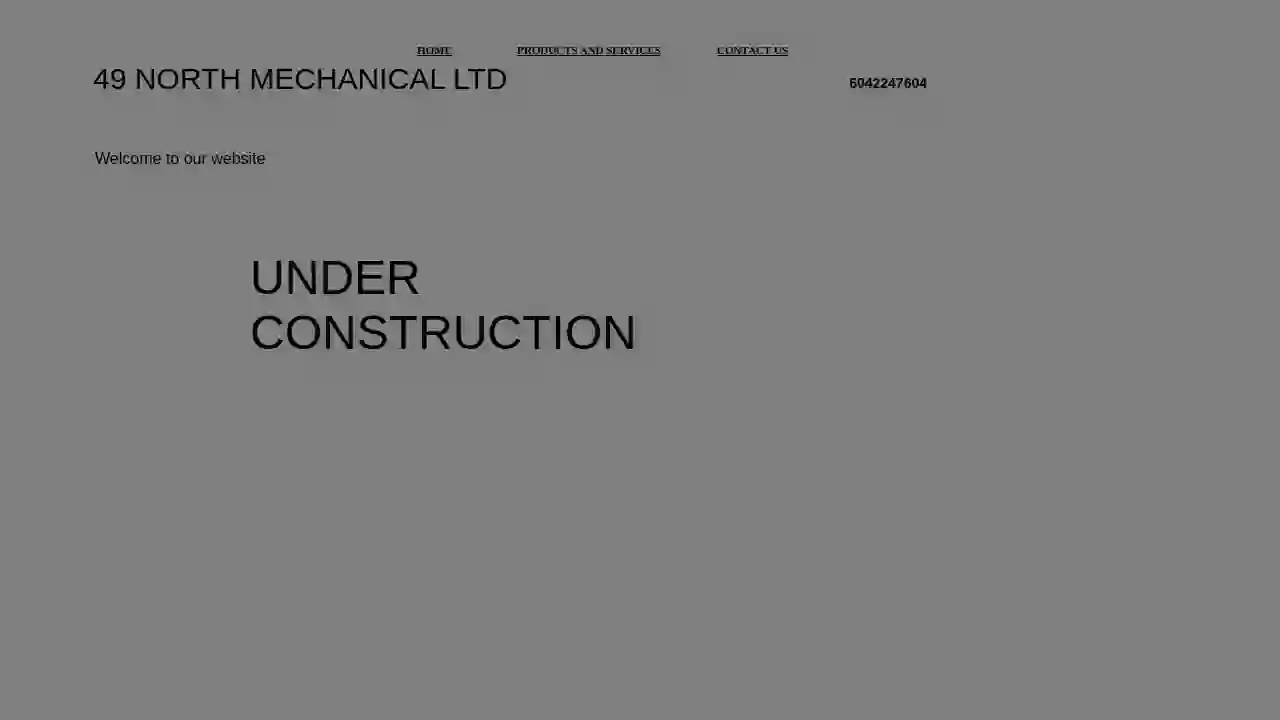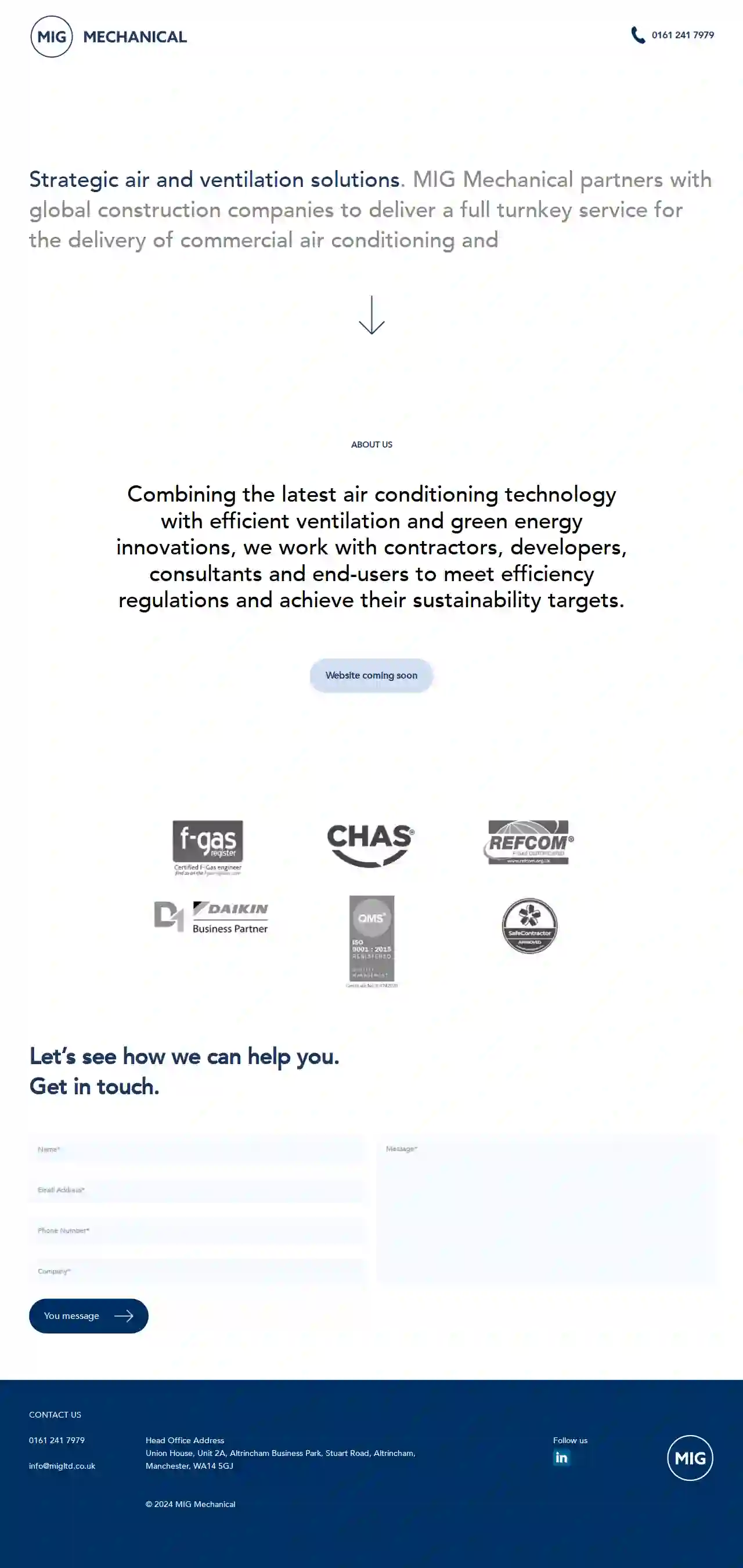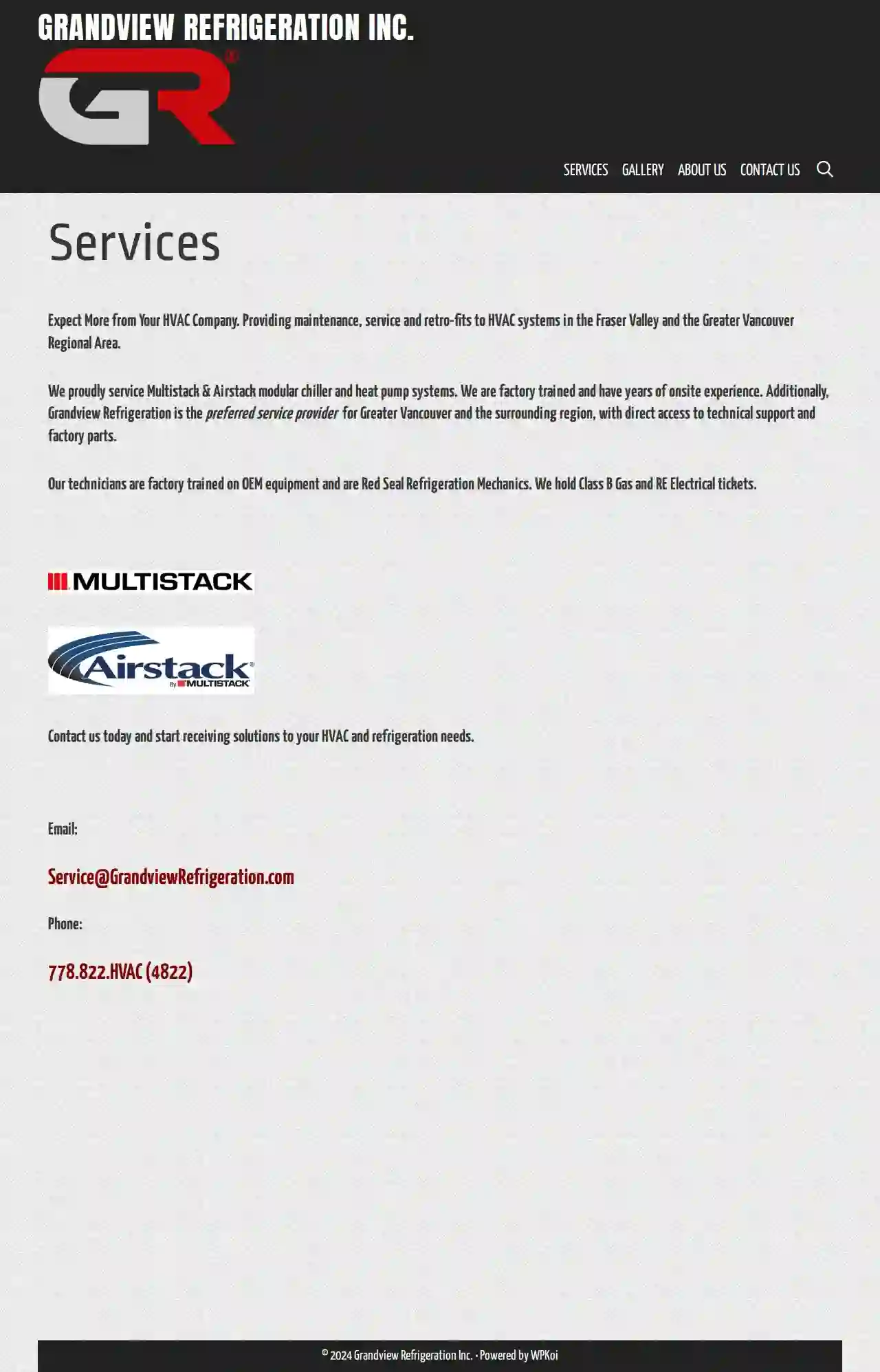HVAC Companies Bowdon
Find the best HVAC Services in Bowdon
Get up to 3 HVAC Contractor quotes for your project today! Compare profiles, reviews, accreditations, portfolio, etc... and choose the best service.

UK Refrigeration & Air Conditioning Ltd
Peterborough, Unit 32 Mere View Ind Est, PE7 3HS, GBA trusted refrigeration & Air Conditioning company based in Peterborough, working nationwide. We specialise in all types of produce cooling, from high humidity to vacuum, and all the alternatives in between. We can talk you through the right refrigeration equipment for your circumstances, carry out a thorough and reliable installation and even provide expert maintenance and repair. We build refrigeration systems for all types of industries, keep your work environment comfortable with a quality air conditioning unit, save money on domestic heating bills with our energy efficient air source heat pumps, and design and build your cold room to the highest standards. We're proud to say that we hold a Level 1 IVQ Certificate in Refrigeration and Air Conditioning awarded by City and Guilds, are members of REFCOM, and have been established since 1999.
- Services
- Why Us?
- Accreditations
- Gallery
Get Quote
Peak Air Conditioning Ltd
Market Court, 20-24 Church St, Altrincham, WA14 4DW, GBHere at PAC we provide quality driven and customer focused mechanical installations across a variety of commercial sectors delivering new build and refurbishment projects in the UK. We specialise in the carefully managed delivery of complete mechanical building services from the initial project survey to final commissioning.
- Services
- Why Us?
- Accreditations
- Our Team
- Gallery
Get Quote
Airmaster Mechanical
54 reviewsLower Mainland, GBWelcome to Airmaster Mechanical, HVAC & MECHANICAL WORKS. We provide all kinds of mechanical and HVAC works including, Furnace & Boiler installation, Heat pumps & Air conditioning, Indoor Air quality and ventilation, Restaurants Exhaust fan and Make-up air systems, WI-FI Thermostats, Restaurant Kitchen hood & ventilation, Commercial ducting & ventilation, RTU, Heat Pumps , Hot Water tank & Boilers. We will work with you to find HVAC solutions that fit your heating and cooling needs. We combine our use of the highest quality parts and equipment, and our dedication to delivering exceptional service to provide you with top quality service. 24 Hour Emergency Service Available. For emergency service, please contact us at your convenience. We look forward to serving you. Covering all areas in lower mainland, vancouver, Canada. FRESH, HEALTHY AIR FOR ALL. Paragon Dedicated Outdoor Air System (DOAS) is the ideal solution to protect your building from harmful pathogens and contaminants. Paragon DOAS brings in up to 100% outside air, to ensure all building occupants have a constant supply of fresh, clean air. With up to 5 times cleaner air than a standard HVAC system, Paragon DOAS is the ideal choice for hospitals, nursing homes, offices, schools, restaurants, or any application requiring fresh outdoor air.
- Services
- Why Us?
- Gallery
Get Quote
Daikin Airconditioning UK Ltd
4.76 reviewsSale, GB- Services
- Why Us?
- Gallery
Get Quote
Controlled Climate Ltd
59 reviews5 Andruss drive, Dundry, BS41 8LJ, GBControlled Climate Limited is a full-service air conditioning company based in Wells, Somerset, near Bristol in the South West of the UK. We offer a total service for air conditioning, from initial site surveys through to non-disruptive installation and post-fitting maintenance. With over 25 years of experience in the industry, we are experts in air conditioning systems, covering both commercial and residential properties. Our team of highly skilled engineers works closely with clients to design bespoke climate control solutions that meet their specific needs. We pride ourselves on providing high-quality workmanship, reliability, and professionalism on every project.
- Services
- Why Us?
- Accreditations
- Gallery
Get Quote
37 DEGREES CLIMATE CONTROL
52 reviews35 Stamford New Road, Altrincham, WA14 1EB, GB37 Degrees Climate Control Ltd is a leading air conditioning specialist serving domestic, commercial, and industrial clients in Sale, Stretford, Altrincham, and Manchester. With over 15 years of experience, our highly qualified engineers are REFCOM registered and F Gas Qualified, ensuring you receive a reliable and professional service. We understand the importance of a comfortable temperature in your home or workplace, and we offer a wide range range of air conditioning services to meet your needs. Whether you're looking to install a new system, require repairs, or need regular servicing to keep your existing system running efficiently, our team is here to help. We offer a variety of air conditioning systems, including ducted, wall-mounted, ceiling cassette, and VRV, and can advise you on the best option for your specific requirements. At 37 Degrees Climate Control, we pride ourselves on providing a 5-star rated service that is both efficient and cost-effective. We are committed to exceeding customer expectations and ensuring your complete satisfaction. Contact us today for a free survey and quotation.
- Services
- Why Us?
- Gallery
Get Quote
49 North Mechanical Ltd.
34 reviews109 8277 129th Street, Surrey, V3W0A6, GBWelcome to our website UNDER CONSTRUCTION
- Services
- Why Us?
Get Quote
MIG Mechanical
Union House, Unit 2A, Altrincham Business Park, Stuart Road, Altrincham, Manchester, WA14 5GJ, GBMIG Group is a company that specializes in engineering, medical, and mechanical excellence. They are known for delivering outstanding healthcare facilities and addressing important challenges faced by their customers. MIG Group has several divisions, including Medical, Mechanical, Qatar, Washroom Fit-Out Company, Facades, and Fit-Out. Their Medical division focuses on healthcare construction, medical gas pipeline testing and installation, and working with organizations like the NHS. The Mechanical division combines the latest air conditioning technology with efficient ventilation and green energy innovations to meet efficiency regulations and sustainability targets. MIG Group's Qatar division delivers better health and pharmaceutical solutions by partnering with global organizations to distribute medical devices, technology, furniture, pharmaceuticals, and supplements. Their Washroom Fit-Out Company division creates transformative washroom spaces that inspire, engage, and motivate users. The Facades division provides bespoke cladding solutions for commercial clients, combining industry-leading expertise, world-class products, and exceptional service. MIG Group's Fit-Out division is currently under development. With over 40 years of experience, MIG Group combines smart, sustainable solutions with a passion for quality to serve a wide range of industries.
- Services
- Why Us?
- Gallery
Get Quote
Combined Comfort Systems
4.932 reviewsVancouver, GBDramatically Reduce Your Home’s Carbon Footprint! VANCOUVERHEATPUMPS.CA Your Greater Vancouver Heat Pump Experts! Receive Up To $19,500.00 In Government Rebates for the installation of heat pumps today! BC Income qualified program how now expanded to to become the CleanBC Better Homes Energy Savings Program. Clink on the link below to pre register for your income qualified promo code today! Click here to register for your promo code today Receive $40,000.00 In Interest free loan towards installation of a new heat pump system! We now have Federal Government 10 YEAR INTEREST FREE LOAN. The Canada Greener Homes Loan helps Canadians make their homes more energy-efficient and comfortable. It offers interest-free financing in addition to the Canada Greener Homes Grant to help you complete some of the more major retrofits recommended by your Click here to register for your Federal Government Loan Limted Time Heat Pumps in the Lower Mainland Receive up to $16,000 in Government rebates LEARN MORE Get a Quote AND SAVE UP TO 60% ON YOUR HOME HEATING COSTS! THE PROVINCE of British Columbia, the Federal Government, and the City of Vancouver have all joined forces in offering up to $16,000 in rebates for homeowners to switch from fossil fuel heating systems (ie: natural gas, propane, oil) to a qualified air-source heat pumps. These Heat Pumps can be fully ducted whole house systems, ductless mini-split systems, or a multi-zone combination of both. As long as we are getting you off fossil fuel as your primary heat source you will qualify. Call now for details! Heat Pump Water Heaters Receive $3500 Get a Quote Upgrade to a qualifying Heat Pump water heater and you could get a rebate of $3,500
- Services
- Why Us?
- Accreditations
- Our Team
- Testimonials
- Gallery
Get Quote
Grandview Refrigeration Inc. (HVAC)
51 reviewsSale, GBGrandview Refrigeration Inc. is your trusted partner for all your HVAC and refrigeration needs in the Fraser Valley and Greater Vancouver Regional Area. We specialize in providing comprehensive maintenance, service, and retro-fit solutions for HVAC systems, with a particular focus on Multistack & Airstack modular chiller and heat pump systems. Our team of factory-trained technicians are Red Seal Refrigeration Mechanics, holding Class B Gas and RE Electrical tickets, ensuring you receive expert and reliable service. As the preferred service provider for Greater Vancouver and the surrounding region, we have direct access to technical support and factory parts, guaranteeing prompt and efficient solutions. Contact us today to experience the Grandview Refrigeration difference and let us take care of your HVAC and refrigeration needs.
- Services
- Why Us?
- Gallery
Get Quote
Over 12,692+ HVAC Contractors onboarded
Our HVAC contractors operate in Bowdon & surrounding areas!
HVACCompaniesHub has curated and vetted the Best HVAC Contractors in and around Bowdon. Find a top & trustworthy contractor today.
Frequently Asked Questions About HVAC Companies
- Regular Maintenance: Schedule annual HVAC maintenance to ensure your system is running at peak efficiency.
- Programmable Thermostat: Use a programmable or smart thermostat to optimize temperature settings based on your schedule.
- Seal Air Leaks: Caulk and weatherstrip windows and doors to prevent drafts.
- Proper Insulation: Ensure adequate insulation in your attic, walls, and floors to prevent heat loss in winter and heat gain in summer.
- Ventilation: Use fans strategically to circulate air and reduce reliance on AC.
- Energy-Efficient Appliances: Choose energy-efficient appliances to reduce your overall energy load.
- HVAC Zoning: Consider zoning your HVAC system to condition different areas of your home separately.
- AC Repair: [Price Range]
- Furnace Repair: [Price Range]
- AC Installation: [Price Range]
- Furnace Installation: [Price Range]
- Heat Pump Installation: [Price Range]
- HVAC Maintenance: [Price Range]
What is the best temperature to set my thermostat in summer?
How often should I have my HVAC system serviced?
How can I reduce my HVAC energy consumption?
How much do HVAC services cost?
What is the best temperature to set my thermostat in summer?
How often should I have my HVAC system serviced?
How can I reduce my HVAC energy consumption?
- Regular Maintenance: Schedule annual HVAC maintenance to ensure your system is running at peak efficiency.
- Programmable Thermostat: Use a programmable or smart thermostat to optimize temperature settings based on your schedule.
- Seal Air Leaks: Caulk and weatherstrip windows and doors to prevent drafts.
- Proper Insulation: Ensure adequate insulation in your attic, walls, and floors to prevent heat loss in winter and heat gain in summer.
- Ventilation: Use fans strategically to circulate air and reduce reliance on AC.
- Energy-Efficient Appliances: Choose energy-efficient appliances to reduce your overall energy load.
- HVAC Zoning: Consider zoning your HVAC system to condition different areas of your home separately.
How much do HVAC services cost?
- AC Repair: [Price Range]
- Furnace Repair: [Price Range]
- AC Installation: [Price Range]
- Furnace Installation: [Price Range]
- Heat Pump Installation: [Price Range]
- HVAC Maintenance: [Price Range]